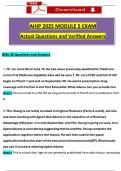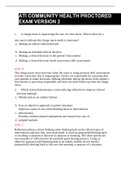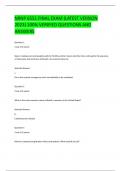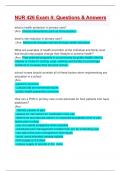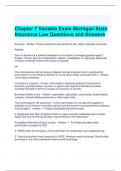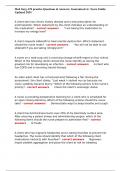CPA Ethics EXAM 2024-2025 QUESTIONS AND ANSWERS 100 % PASS
SOLUTION A+ GRADE
Ethics rules promulgated by the PCAOB must be approved
by:
(a) The GAO
(b) The SEC
(c) The IRS
( d) They do not need the approval of any other governmental agency. - answer>>(b) is correct. The SEC
must approve PCAOB ethics
rules.
Which category contains the ethical standards, a violation of which makes a member liable to
disciplinary action?
(a) Ethics Rulings.
(b) Interpretations of the Rules.
(c) Rules. - answer>>(c) is the conect answer. Code of Professional
A CPA and his firm have been threatened, in writing, with a lawsuit by an audit client who claims that his
prior year's inventory was understated and as a result his firm was not able to obtain the financing it
needed to expand operations. His letter states that he believes
faulty auditing procedures were responsible for thealleged understatement of inventory. The amount of
understated inventory at issue is $50,000. In this situation the CPA would be
(a) independent with respect to his client since it
has not been proven that the auditing procedures
were at fault.
(b) not independent with respect to his client since
the allegation, though not proven, has been made
that his audit was not adequate. - answer>>(b) is correct. Independence is impaired because of the
threat of faulty auditing (Interpretation 101-6,
,Litigation between client and member 3).
A CPA's client has threatened suit against the CPA and his furn for $2,000 claiming that due to faulty
administrative procedures of the CPA's furn, their tax return was filed late. The $2,000 represents
interest and late penalties imposed by the government plus an amount for legal fees incurred in bringing
the action. Total annual audit and tax fees from this client are approximately $45,000 a year. This
threatened action by the client will
(a) impair independence with the client.
(b) not impair independence with the client. - answer>>(b) is correct. Independence not impaired
because
of the immaterial amount involved and the litigation would not involve an attest engagement
(Interpretation 101-6, litigation between client and member 4)
An insurance company, under subrogation rights, has sued a CPA and her firm for $100,000. The
insurance company paid $ 100,000 to a client of the furn becauseof an embezzlement of that amount by
one of the client's former employees. The former employee has admitted the theft, declared personal
bankruptcy, and is serving a three-year term in a federal prison upon being convicted of this theft. The
client's management, its board of directors, and its legal counsel have investigated the matter and
decided that since the fraud involved collusion with outside parties by the former employee, the CPA
using normal audit procedures would not have been expected to discover the theft. In these
circumstances
(a) the CPA and her furn are independent of the client.
(b) the CPA and her furn are not independent of the
client. - answer>>(a) is correct. Independence is not impaired because management is not accusing the
auditing firm of faulty procedures (Interpretation 101-6, Other third party litigation.).
A partner in a CPA firm purchases a limited partnership interest in an oil tax shelter. The amount is
material to her net worth. She later finds out that the president of one of her audit clients and the
treasurer of another audit client have also each purchased limited partnership interests. The general
partner who controls the partnership is a non-client. The interests are material to the net worth of the
president and treasurer. Each of the three heard about this tax shelter from their broker. In this
situation
(a) independence is impaired with respect to these
two clients.
,(b) independence is not impaired with respect to
these two clients. - answer>>(b) is correct. Since the limited partners do not control the partnership,
they are not in a joint closely held investment, and therefore independence is not impaired. The general
partner controls the partnership and the limited partners are merely investors (Chapter 3, Definitions,
Joint closely held investment and Interpretation 101-1A.3).
A partner who has been retired for two years continues to serve on the governing board of the
accountingfirm. This group meets monthly and fulfills the role of a board of directors. The retired
partner has no client responsibilities and thus no chargeable time. The retired partner is asked to
become a director of an audit client. Acceptance of the director's position would
(a) impair independence with this client.
(b) not impair independence with this client. - answer>>(a) is correct. The partner is still active in the
firm and thus independence would be impaired (Interpretation 101-2, 3).
A member has been asked to cosign checks with an employee of a client during the month of January
when the president is on vacation. The president has stated that with the CPA cosigning checks, she will
be confident that disbursements are being handled properly. Since
(a) the member will merely be countersigning, and
thus not making the original decision to draw the
check, independence with the client will not be
impaired.
(b) the member is only a co-signer and for only one twelfth
of the year, independence is not impaired.
( c) check signing is a management function, independence
is impaired. - answer>>(c) is correct. Check signing impairs independence.
(Interpretation 101-3, Table, Non tax disbursement).
In a one-office firm a partner's wife works as a cashier for one of the firm 's audit clients. The partner
does not work on the engagement for this client. The wife's position as cashier impair the firm's
independence with this client.
(a) does
, (b) does not - answer>>(b) is correct. Her position does not impair independence. The partner is a
covered member (Chapter 3, Definitions, Covered member d). His wife is immediate family (Chapter 3,
Definitions, Immediate family). Cashier is not a key position, (Chapter 3, Definitions, Key position). Thus
independence is not impaired (Interpretation 101-1, Application of the Independence Rules to a
Covered Member's Immediate Family 1).
In question 30, what if the partner worked on the engagement for this client? Would the wife's position
as
cashier impair the firm's independence with this client?
(a) Yes, it would impair independence.
(b) No, it would not impair independence. - answer>>(b) is correct. Her position does not impair
independence. The partner is a covered member (Chapter 3, Definitions, Covered member a). His wife is
immediate family (Chapter 3, Definitions, Immediate family). Cashier is not a key position, (Chapter 3,
Definitions, Key position). Thus independence is not impaired (Interpretation 101-1, Application of the
Independence Rules to a Covered Member's Immediate Family 1).
A partner in the Milwaukee office of a CPA firm has
a sister who is president of a Chicago-based company
that is a client of his firm's Chicago office. The Milwaukee
office does no work for this client. The CPA firm
______ independent of his sister's Chicago company.
(a) is
(b) is not - answer>>(a) is correct. The fum is independent. The partner's
sister is a close relative (Chapter 3, Definitions,
Close relative). Independence impairment due to
close relatives relationships with a client apply only
to partners who work on the engagement, who can influence the engagement or who is in the office
where the partner in charge of the engagement is located (Interpretation 101-1, Application of the
Independence Rules to Close Relatives). Since this partner does not meet any of those criteria,
independence is not impaired.
SOLUTION A+ GRADE
Ethics rules promulgated by the PCAOB must be approved
by:
(a) The GAO
(b) The SEC
(c) The IRS
( d) They do not need the approval of any other governmental agency. - answer>>(b) is correct. The SEC
must approve PCAOB ethics
rules.
Which category contains the ethical standards, a violation of which makes a member liable to
disciplinary action?
(a) Ethics Rulings.
(b) Interpretations of the Rules.
(c) Rules. - answer>>(c) is the conect answer. Code of Professional
A CPA and his firm have been threatened, in writing, with a lawsuit by an audit client who claims that his
prior year's inventory was understated and as a result his firm was not able to obtain the financing it
needed to expand operations. His letter states that he believes
faulty auditing procedures were responsible for thealleged understatement of inventory. The amount of
understated inventory at issue is $50,000. In this situation the CPA would be
(a) independent with respect to his client since it
has not been proven that the auditing procedures
were at fault.
(b) not independent with respect to his client since
the allegation, though not proven, has been made
that his audit was not adequate. - answer>>(b) is correct. Independence is impaired because of the
threat of faulty auditing (Interpretation 101-6,
,Litigation between client and member 3).
A CPA's client has threatened suit against the CPA and his furn for $2,000 claiming that due to faulty
administrative procedures of the CPA's furn, their tax return was filed late. The $2,000 represents
interest and late penalties imposed by the government plus an amount for legal fees incurred in bringing
the action. Total annual audit and tax fees from this client are approximately $45,000 a year. This
threatened action by the client will
(a) impair independence with the client.
(b) not impair independence with the client. - answer>>(b) is correct. Independence not impaired
because
of the immaterial amount involved and the litigation would not involve an attest engagement
(Interpretation 101-6, litigation between client and member 4)
An insurance company, under subrogation rights, has sued a CPA and her firm for $100,000. The
insurance company paid $ 100,000 to a client of the furn becauseof an embezzlement of that amount by
one of the client's former employees. The former employee has admitted the theft, declared personal
bankruptcy, and is serving a three-year term in a federal prison upon being convicted of this theft. The
client's management, its board of directors, and its legal counsel have investigated the matter and
decided that since the fraud involved collusion with outside parties by the former employee, the CPA
using normal audit procedures would not have been expected to discover the theft. In these
circumstances
(a) the CPA and her furn are independent of the client.
(b) the CPA and her furn are not independent of the
client. - answer>>(a) is correct. Independence is not impaired because management is not accusing the
auditing firm of faulty procedures (Interpretation 101-6, Other third party litigation.).
A partner in a CPA firm purchases a limited partnership interest in an oil tax shelter. The amount is
material to her net worth. She later finds out that the president of one of her audit clients and the
treasurer of another audit client have also each purchased limited partnership interests. The general
partner who controls the partnership is a non-client. The interests are material to the net worth of the
president and treasurer. Each of the three heard about this tax shelter from their broker. In this
situation
(a) independence is impaired with respect to these
two clients.
,(b) independence is not impaired with respect to
these two clients. - answer>>(b) is correct. Since the limited partners do not control the partnership,
they are not in a joint closely held investment, and therefore independence is not impaired. The general
partner controls the partnership and the limited partners are merely investors (Chapter 3, Definitions,
Joint closely held investment and Interpretation 101-1A.3).
A partner who has been retired for two years continues to serve on the governing board of the
accountingfirm. This group meets monthly and fulfills the role of a board of directors. The retired
partner has no client responsibilities and thus no chargeable time. The retired partner is asked to
become a director of an audit client. Acceptance of the director's position would
(a) impair independence with this client.
(b) not impair independence with this client. - answer>>(a) is correct. The partner is still active in the
firm and thus independence would be impaired (Interpretation 101-2, 3).
A member has been asked to cosign checks with an employee of a client during the month of January
when the president is on vacation. The president has stated that with the CPA cosigning checks, she will
be confident that disbursements are being handled properly. Since
(a) the member will merely be countersigning, and
thus not making the original decision to draw the
check, independence with the client will not be
impaired.
(b) the member is only a co-signer and for only one twelfth
of the year, independence is not impaired.
( c) check signing is a management function, independence
is impaired. - answer>>(c) is correct. Check signing impairs independence.
(Interpretation 101-3, Table, Non tax disbursement).
In a one-office firm a partner's wife works as a cashier for one of the firm 's audit clients. The partner
does not work on the engagement for this client. The wife's position as cashier impair the firm's
independence with this client.
(a) does
, (b) does not - answer>>(b) is correct. Her position does not impair independence. The partner is a
covered member (Chapter 3, Definitions, Covered member d). His wife is immediate family (Chapter 3,
Definitions, Immediate family). Cashier is not a key position, (Chapter 3, Definitions, Key position). Thus
independence is not impaired (Interpretation 101-1, Application of the Independence Rules to a
Covered Member's Immediate Family 1).
In question 30, what if the partner worked on the engagement for this client? Would the wife's position
as
cashier impair the firm's independence with this client?
(a) Yes, it would impair independence.
(b) No, it would not impair independence. - answer>>(b) is correct. Her position does not impair
independence. The partner is a covered member (Chapter 3, Definitions, Covered member a). His wife is
immediate family (Chapter 3, Definitions, Immediate family). Cashier is not a key position, (Chapter 3,
Definitions, Key position). Thus independence is not impaired (Interpretation 101-1, Application of the
Independence Rules to a Covered Member's Immediate Family 1).
A partner in the Milwaukee office of a CPA firm has
a sister who is president of a Chicago-based company
that is a client of his firm's Chicago office. The Milwaukee
office does no work for this client. The CPA firm
______ independent of his sister's Chicago company.
(a) is
(b) is not - answer>>(a) is correct. The fum is independent. The partner's
sister is a close relative (Chapter 3, Definitions,
Close relative). Independence impairment due to
close relatives relationships with a client apply only
to partners who work on the engagement, who can influence the engagement or who is in the office
where the partner in charge of the engagement is located (Interpretation 101-1, Application of the
Independence Rules to Close Relatives). Since this partner does not meet any of those criteria,
independence is not impaired.

